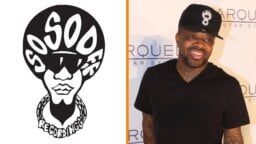If the past success of the individuals involved in a project is anything to go by, there’s a good chance you’re about to hear a lot more about ‘global girl group’ KATSEYE.
The group, created by the HYBE and Geffen joint venture HxG, is set to release their debut single this summer following an intense two-year development period.
Around the same time, a Netflix documentary on the KATSEYE’s audition process will air — a project that’s seen the HYBE/Geffen team working “20 hours a day, almost seven days a week,” for the last year, according to HxG President Mitra Darab. (It follows on from YouTube series, Dream Academy, that went live in 2023.)
The idea behind the group is to replicate the K-pop methodology of development, which sees a label focus on carefully crafting one act at a time (as Hybe did with BTS and is now doing with Tomorrow X Together). Label deals are typically 360-style arrangements that cover areas including branding, creative, choreography, marketing, business strategy, touring and management.
HxG is one of the first US ventures from HYBE, so, as Darab points out, there’s a lot of pressure to succeed. Having Darab at the helm should add a strong degree of confidence. She’s a 26-year music business veteran who has a wealth of experience in pop marketing, having held senior roles at Geffen, Warner Bros. Records and Capitol Music Group.
During that time, Darab has worked on campaigns for the likes of Madonna, Michael Bublé, Tom Petty & The Heartbreakers, Cher, Sam Smith and 5 Seconds of Summer.
Before she got the HxG job, Darab had left Capitol in search of a different challenge, and gone down a “really deep vortex of K-pop” with the eventual aim of setting up an agency with a friend.
“I found so much joy in K-pop and became fascinated with the marketing, the creative and 360 aspect of it. It was incredible,” she says.
The universe had a different plan and when Darab got the call about HxG, it felt like a good fit. She remembers: “When I got this call, I thought, ‘Wow. This is the only thing that’s going to make me go back into this system and leave trying to forge my own company’. It perfectly blends my expertise in global pop marketing with this newfound passion of mine.”
Darab, who grew up in Chicago, knew she wanted to work in music age 16 and set her sights on A&R. Upon graduating, she moved to LA on the promise to her parents (who were immigrants and, according to Darab, expected her to be a doctor or lawyer) that she had one year to try and make it work.
At the end of the year, she settled for a job in advertising before a former boss made an introduction that led her to Geffen Records.
A year later, she moved into A&R, where she remained for five years before a new boss — Diarmuid Quinn, who now manages Josh Groban — moved a then-reluctant Darab into marketing. The rest, as they say, is history.
Here, we chat to Darab about KATSEYE, her career to date, lessons learned across it, and more…
You started your career in A&R, which sounds like it was a big area of passion for you, and then, in your own words, reluctantly moved into marketing after a push from your boss at the time and ended up staying there for the best part of your career. How did your mentality change about your role during that time?
It was the greatest move I ever made. I still am very close with that boss. He saw something in me that I didn’t see. What he saw was someone who was clearly driven, passionate and loved music, but I loved strategy and I loved the relationship not only with the artists, but, oddly, with the managers. I knew that if you got the team together and you had one goal, you’d make it.
“Something that I really loved is that in marketing, you’re the hub of the wheel.”
Something that I really loved is that in marketing, you’re the hub of the wheel. You not only deal with everyone internally at the label, but you deal closely with artists and managers in executing their vision, creating that vision and helping them. I always say that there’s two buckets of artists. There’s artists that know exactly what they want and artists that don’t and it’s the team’s job to help them get there. It was the greatest thing to see my skills and develop them tenfold. No offense to A&R, there’s 1,000% a skill in it, but marketing better suits what drove me. I just didn’t know until someone led me that way.
Your career has included stops at Geffen, Warner Bros. Records and Capitol Music Group. What are the biggest lessons you’ve learned across those various roles that have stayed with you today?
The biggest lesson I learned from each role is that when you get promoted, you have to relinquish some of the duties from your old role. That was hard for me. You get promoted because you’re good at something and then you’re put in this bigger role that you’ve never done before so you have to learn how to adjust, communicate and delegate differently.
“Communication is always the one lesson in everything that I’ve gone through.”
Everything I’ve learned has helped me with my current role because one of the hardest things I have to manage, which gets easier and easier, is dealing with two different cultures and being in the middle of that.
How do you keep everyone on the same team and on the same page moving forward? Communication is always the one lesson in everything that I’ve gone through. With that said, the other person has to comprehend, right? Comprehension is part of communication.
KATSEYE is made up of members from various parts of the world. They’re based in LA and the music isn’t K-pop, but you’re using the K-pop development model.
That’s what I love about this. The principles of K-pop are what make it so magical to me. It’s the true training and development of each artist. We aren’t going too much in the [musical] direction of [K-pop], it is more global pop. We have six girls from all over the world. Three of them are from the US but of those, one is of Chinese American descent, one is of Indian descent and one is half Cuban and Venezuelan. Of the three other girls, one is Swiss German, one is from the Philippines and one is from Korea.
The principles [that we’re taking from K-pop] are the training and development of the artists, the level of creativity; it’s the choreo, it’s the attitude, it’s the camaraderie and the biggest thing of all, which I can talk about for hours, is that fandom is completely different to how it is on the pop side.
The way it works in K-pop is that your number one thing is your relationship with your fans. Weverse is a huge component of that, the fan meets are a huge component, the packaging, the interaction… it is a community. I don’t want to discredit pop, where you have [fan groups like] Swifties and Selenators, but until you immerse yourself in the K-pop fandom and go to a K-pop show… I’ve been around for 25 years and I’ve never seen anything like it.
Is there anything the wider music business could learn from the way K-pop acts nurture their fanbase?
I’ve thought about that a lot but it’s up to the artist. The difference is, these artists in traditional K-pop groups are very familiar with it. It’s how they’re brought up, it’s a cultural thing. The challenge is when something is so unique to a specific culture in terms of how they cultivate these fandoms, the loyalty, dedication, and the psychology behind these fans. But you can take those key principles, which is constant interaction and making your fans feel part of the process.
“If I was ever to go back and sit down with artists [I’ve worked with], I’d explain how valuable it is to have the superfan from day one.”
That’s what we did last year with the Dream Academy. Part of the reason we did that is because in K-pop, there are fans that want to be part of that process and want to root for their favorite trainee or contestant. They feel they are the ones to help get the girls in the group. When they are dedicated that early on, it’s very rare that you’re going to lose them and they will rally to get everyone they know to be to be a fan and part of that community
Non-K-pop artists, Western artists, have to put their fans on the same level to where they place their craft and their artistry. It’s all one package in K-pop: how you create the music and the artists and how you create the fandom and the relationship. If I was ever to go back and sit down with artists [I’ve worked with], I’d explain how valuable it is to have the superfan from day one.
Some people would criticize the 360 model you’re using for KATSEYE and the one that’s used in K-pop in general. How would you respond to that?
In the Western world, 20 years ago, there was this big movement to do 360 deals and that did not go well. But we don’t treat our artists like a number. We want to have their point of view, we put great effort and care into their mental health and that’s been a really big thing for us.
The 360 aspect to me is a better way to succeed. What I’m learning is that it isn’t so fragmented, there’s a synergy amongst everyone because you have one goal and that goal is to make this group successful. Even though it can work successfully, when you have a manager, a booking agent and all of these different people working and having their own agenda, you sometimes see the challenges in that. When everyone has one common goal, you move in a much clearer way, you’re not zigzagging into where you need to go. You’re all aligned and moving forward together. That’s what I love about 360 deals: the synergy and the communication. I just find it seamless.
Back in 2021, the HYBE/Geffen joint venture was set to debut a K-pop boy band. Why did the direction change?
I wasn’t part of that decision, when I came in, we were full fledged into creating a girl group. It was really simple, I think they felt that they had a good presence in the boy group world and just knowing what the concept was, of having a global girl group, they felt, and I agree, that the power of that would resonate much more in a global sense. Not to discredit men but I think the power of women is remarkable. I love it and I’m glad that they did that. I think it was the right move.
As you will know, especially from your early career, the A&R world has typically been very male dominated, although there are signs that’s changing. What impact do you think more diversity in this field has on the acts that are being developed?
I think it’s important because when you’re trying to find songwriters or producers that understand the sentiment of a woman, isn’t it best to have a woman? Not to discredit the fact that many of our songs are written by men, but I think it’s really important for us to have that diversity and I think that’s one of the main reasons why I was brought in.
I never looked at myself as someone who got a job because of my gender, this is the first time where I laugh and think… did I? But it was the right thing to do. Now that I’m in it, you need a woman leading this venture. It’s important for people to understand how to create the right team to support an act like this.
I also think that one of the reasons why I can do this job is because I am a daughter of immigrant parents. I speak another language, I was exposed to another culture my entire life. So none of that feels weird to me. When I sit in a room and everyone’s speaking Korean but me, I love it. I respect it and I feel because of that, I know how to be that bridge between the two cultures, between the two labels. I understand both and I have great respect for both sides.
Here’s a more personal question: what’s the best piece of career related advice that you’ve ever been given?
To play offense, not defense. Obviously a man gave me that advice. But I understood what he meant by it, which is if you did something wrong, own up to it. If your strategy didn’t work, own up to it. Pivot, think of a way to keep moving forward. I really appreciated that because I always owned up to anything if I ever messed up.
The other piece of advice was from Diarmuid. He would always say, ‘Don’t come to me with a complaint, come to me with the solution as well’. I know that you go to your manager or your leader because you want them to help you but you’re never going to learn those skills if someone’s always helping you. Diarmuid really helped to cultivate the leader I am today.
The other thing that I want to give him credit for is that he always gave me the spotlight, it’s very rare that you have a boss who doesn’t want to take credit. I appreciate him for always giving me the platform so that I could figure things out on my own and grow on my own but always kind of being there, watching me.
What would you change about the music industry and why?
Back in the day, when people were downloading music for free and no one was keeping up with that or what’s currently going on with AI, those are really big things that the industry has to talk about and rally around. I know there are some really strong advocates for how to keep the rights for artists but I just hope that the industry doesn’t get arrogant again.
Many of these companies are making billions and doing very well. I hope that remains because the music industry is a gift and I love that I’ve been part of all different eras of it: the good, the bad and the good again. Don’t sleep on technology, music industry. That’s what I would say.
If you could go back to the beginning of your career and tell yourself one thing, what would it be?
Ask for what you want. I come from a culture, or maybe just an era, where I thought that if I put my head down and do my job, I will magically get this, this, this, and this. It wasn’t until I started asking, ‘Hey, can I be in this meeting?’ [that I started getting what I wanted]. I’m not talking about asking for a [pay] rise, those things came, it’s more about putting yourself in the right place.
“Be kind to everyone. There’s no reason to not be and you never know who you’re going to cross paths with again.”
I also tell everyone, to be kind to everyone. There’s no reason to not be and you never know who you’re going to cross paths with again. It’s so interesting that many of my former colleagues and people I love from Capitol, who I thought I would never cross paths with again, that’s how foolish I was, now, I’m working with several of them because of the [Interscope Geffen A&M and Capitol] merger. The good thing is they are people I absolutely love but you never know. Speak good to people.
Final question: ultimate plans and ambitions?
I want to leave on a high note, I want the end of my career to be making this group the biggest group ever. I don’t think anyone I work with likes it when I say that, but there is a part of me that wants to move on to different things in life. I have been someone who solely dedicated myself to my career and I don’t regret that.
But there are other things in life and I just don’t know how to balance those with work. Right now, it’s all about work and I love it. It gives me a lot of joy and a lot of passion, I still have that fire and drive. When that starts to fade, I’ll know. So my only goal right now is to make this really huge and then leave and move to Tokyo!
Virgin Music Group is the global independent music division of Universal Music Group, which brings together UMG’s label and artist service businesses including Virgin and Ingrooves.Music Business Worldwide





